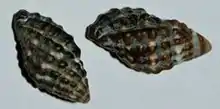Claremontiella nodulosa
Claremontiella nodulosa, common name: the blackberry drupe, is a species of sea snail, a marine gastropod mollusk in the family Muricidae, the murex snails or rock snails.[1]
| Claremontiella nodulosa | |
|---|---|
 | |
| Scientific classification | |
| Domain: | Eukaryota |
| Kingdom: | Animalia |
| Phylum: | Mollusca |
| Class: | Gastropoda |
| Subclass: | Caenogastropoda |
| Order: | Neogastropoda |
| Family: | Muricidae |
| Genus: | Claremontiella |
| Species: | C. nodulosa |
| Binomial name | |
| Claremontiella nodulosa (Adams, 1845) | |
| Synonyms[1] | |
| |
Description
This shell commonly called Blackberry drupe is commonly found in rocky areas along South-east of Florida coast and the Florida keys.[1] The size of an adult shell varies between 13 mm and 25 mm. Its body is encrusted and the proloconch eroded.
[1]An adult blackberry drupe can be distinguished from others by:
1. It's thick lips coupled with about 4-5 large beads on the inside of the lips.
2. Its purple coloured aperture.
3. Grossly studded telechonch and body whorl with round black beeds.
Distribution
This species is distributed in the Caribbean Sea, the Gulf of Mexico, the Lesser Antilles, the Atlantic Ocean along Brazil, Cape Verde, Angola and Gabon.
References
- MolluscaBase eds. (2021). MolluscaBase. Claremontiella nodulosa (C. B. Adams, 1845). Accessed through: World Register of Marine Species at: http://marinespecies.org/aphia.php?p=taxdetails&id=1335417 on 2021-08-17
- Bernard, P.A. (Ed.) (1984). Coquillages du Gabon [Shells of Gabon]. Pierre A. Bernard: Libreville, Gabon. 140, 75 plates pp
- Gofas, S.; Afonso, J.P.; Brandào, M. (Ed.). (S.a.). Conchas e Moluscos de Angola = Coquillages et Mollusques d'Angola. [Shells and molluscs of Angola]. Universidade Agostinho / Elf Aquitaine Angola: Angola. 140 pp
- Rolán E., 2005. Malacological Fauna From The Cape Verde Archipelago. Part 1, Polyplacophora and Gastropoda.
- Rosenberg, G., F. Moretzsohn, and E. F. García. 2009. Gastropoda (Mollusca) of the Gulf of Mexico, pp. 579–699 in Felder, D.L. and D.K. Camp (eds.), Gulf of Mexico–Origins, Waters, and Biota. Biodiversity. Texas A&M Press, College Station, Texas
- Garrigues B . & Lamy D. 2018, 218. Muricidae récoltés au cours de la campagne KARUBENTHOS 2 du MNHN dans les eaux profondes de Guadeloupe (Antilles Françaises) et description de trois nouvelles espèces des genres Pagodula et Pygmaepterys (Mollusca, Gastropoda). Xenophora Taxonomy 20: 34-52
- Houart, R.: Zuccon, D. & Puillandre, N. (2019). Description of new genera and new species of Ergalataxinae (Gastropoda: Muricidae). Novapex. 20 (Hors série 12): 1-52
External links
- Adams, C. B. (1845). Specierum novarum conchyliorum, in Jamaica repertorum, synopsis. Proceedings of the Boston Society of Natural History. 2: 1-17
- Reeve, L. A. (1846). Monograph of the genus Ricinula. In: Conchologia Iconica, or, illustrations of the shells of molluscous animals, vol. 3, pl. 1-6 and unpaginated text. L. Reeve & Co., London
- "Trachypollia nodulosa". Gastropods.com. Retrieved 12 May 2011.